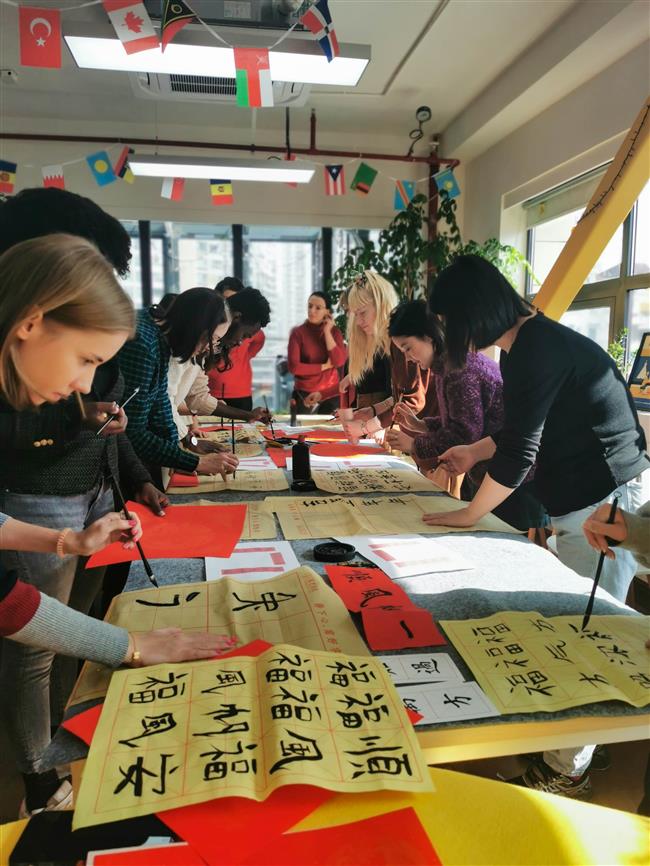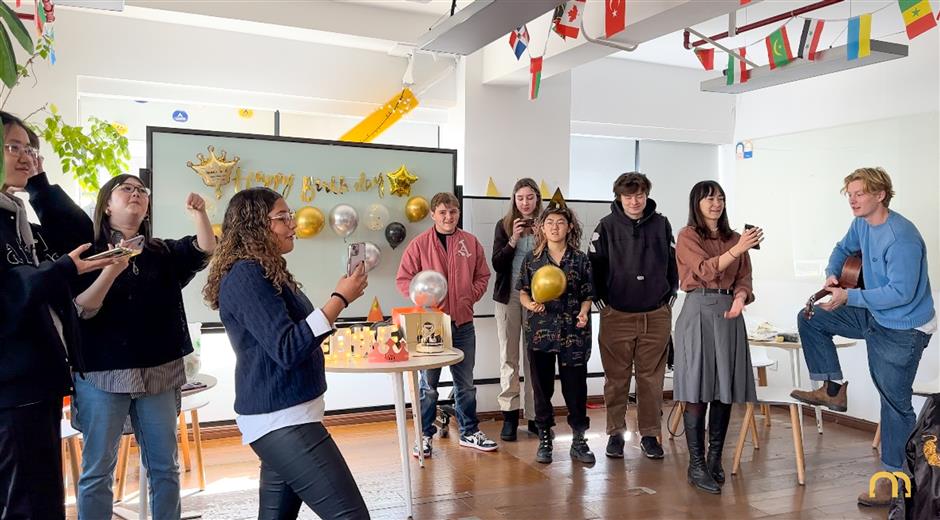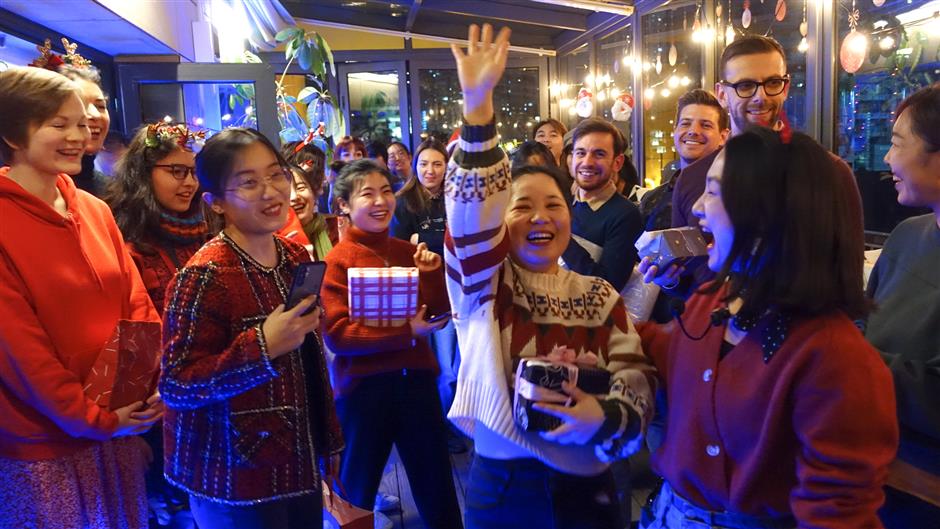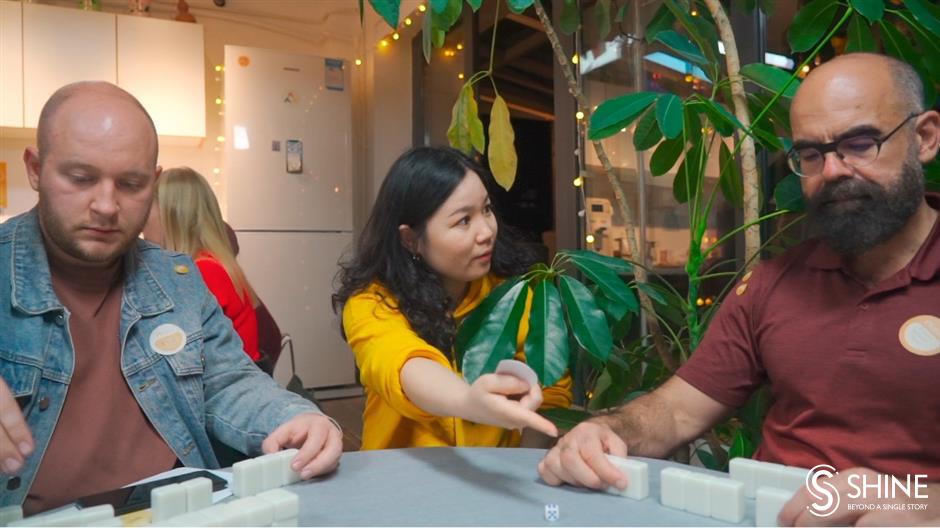
今日上海
老外学习汉语之旅 - 2023年12月06日
A touch of class – saying ni hao instead of 'hello'
Ina Henriksen from Norway is studying Chinese at the That's Mandarin Language School. She has nailed phrases like "practice makes perfect" (熟能生巧) and "devastatingly beautiful" (倾国倾城).
"My mother is Chinese, born and raised in Sichuan Province, so I want to learn Mandarin so I can more fully appreciate her native language and culture," said Henriksen. "Moreover, I visit my grandparents in Panzhihua every year, and I want to be able to converse with them more fluently."
Henriksen, an undergraduate student, had been studying at the school for weeks, taking advantage of a holiday at her university.

Students learn Chinese calligraphy at That's Mandarin, a leading Chinese language teaching school in the country.
Founded in 2005, That's Mandarin, which now has campuses in both Shanghai and Beijing, has become one of the most popular Chinese language schools in the country.
Every year more than 10,000 students from all over the world enroll, both for online and offline lessons.
At the Shanghai campus, 80-plus teachers lead courses tailored to different student needs, like workplace Mandarin or preparing for the Hanyu Shuiping Kaoshi (HSK), or Chinese Proficiency Test.
The school provides intensive classes of less than 10 people that last for an entire morning, five days a week. There are also part-time courses of two hours' duration, twice a week. And one-on-one lessons are also available.
Lesson prices vary from 115 yuan (US$15.80) per class to more than 200 yuan.

Ina Henriksen (second from right) at a birthday party for a student at That's Mandarin.
Lead teacher Guo Jingjing has been with the school for about five years. She has a bachelor's degree in English and a master's degree in teaching Chinese to foreigners. Prior to joining the school's faculty, she was an English teacher for preschoolers.
"Teaching adults and teaching children are very different," she said. "I remember on my first day at the school, eight students looked at me, and I worried I might mess everything up."
But the conviviality of the students soon eased her anxieties. In particular, she remembers a French student in the class.
"His name was Mohammad, and I asked if we could call him 'Momo,'" she said. "He cheerfully agreed. I truly felt that we were not only teacher-students, but also friends."

Guo Jingjing (middle) during a night party held at the school for students.
Teachers with the school deploy different methods to help the students understand the pronunciation of Chinese characters. For example, Italian students are told that the Mandarin word for "he," "she" and "it" sounds the same the last syllable of "pasta."
Guo said there is an element of "cultural shock" to overcome. Some students who have never been to China before come to class with preconceived notions about the country.
"For example, a student once said that the reason why Chinese people are used to drinking hot water is because the water is unclean," she said. "I told him that a custom is a custom, which doesn't have anything to do with water quality. When Chinese people are sick, family and friends just naturally tell them, 'Drink some hot water.'"
Guo said she enjoys give-and-take with her students.
"We often challenge each other in class," she said. "It's healthy. The students become more inclusive, listen more attentively and come to appreciate cultural diversity. I'm proud of that."

Guo teaches students how to play mahjong.
Guo said she believes that teaching Chinese goes beyond just language skills; it also encompasses cultural exchange.
"As a Chinese idiom goes, 'Teaching others is teaching yourself,'" she said. "We actually learn a lot from the students. Besides, I think it is our responsibility to help them integrate into the communities where they live in China."
The school holds social activities to encourage integration of students from different countries. Some recent events included a mahjong session and one celebrating the Double Ninth Festival.
Jaime Lozano from Spain said he really likes mahjong and hu le ("won") several times the first time he played.
"China has very rich culture, and I think Mandarin sounds beautiful," said Lozano. "I have made many friends here, and language knowledge helps a lot in daily life."
Guo said her dream is to someday open a Chinese language school overseas.
"I hope that one day, when people greet each other, they say ni hao instead of 'hello.'"

Apart from indoor classes, the school also organizes trips for students to experience Chinese landscape and culture.
Source: Shanghai Daily

